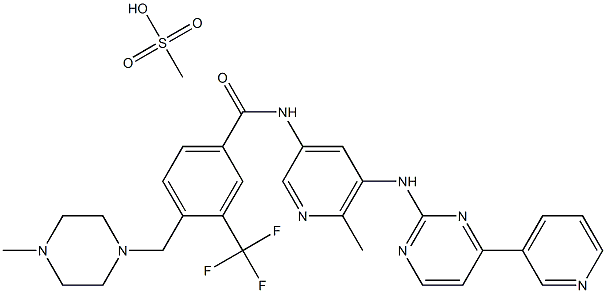COMPUTED DESCRIPTORS
| Molecular Weight | 658.7 g/mol |
|---|---|
| Hydrogen Bond Donor Count | 3 |
| Hydrogen Bond Acceptor Count | 14 |
| Rotatable Bond Count | 7 |
| Exact Mass | 658.22975722 g/mol |
| Monoisotopic Mass | 658.22975722 g/mol |
| Topological Polar Surface Area | 162 Ų |
| Heavy Atom Count | 46 |
| Formal Charge | 0 |
| Complexity | 934 |
| Isotope Atom Count | 0 |
| Defined Atom Stereocenter Count | 0 |
| Undefined Atom Stereocenter Count | 0 |
| Defined Bond Stereocenter Count | 0 |
| Undefined Bond Stereocenter Count | 0 |
| Covalently-Bonded Unit Count | 2 |
| Compound Is Canonicalized | Yes |
PRODUCT INTRODUCTION
description
Flumatinib Mesylate is the orally bioavailable, mesylate salt form of the tyrosine kinase inhibitor flumatinib, with potential antineoplastic activity. Upon administration, flumatinib inhibits the wild-type forms of Bcr-Abl, platelet-derived growth factor receptor (PDGFR) and mast/stem cell growth factor receptor (SCFR; c-Kit) and forms of these proteins with certain point mutations. This results in the inhibition of both Bcr-Abl-, PDGFR- and c-Kit-mediated signal transduction pathways, and the proliferation of tumor cells in which these kinases are overexpressed. Bcr-Abl fusion protein is an abnormal, constitutively active enzyme expressed in Philadelphia chromosome positive chronic myeloid leukemia (CML), acute lymphoblastic leukemia (ALL) or acute myelogenous leukemia (AML). PDGFR, upregulated in many tumor cell types, is a receptor tyrosine kinase essential to cell migration and the development of the microvasculature. c-kit, a receptor tyrosine kinase mutated and constitutively activated in certain tumors, plays a key role in tumor cell survival, proliferation, and differentiation.
